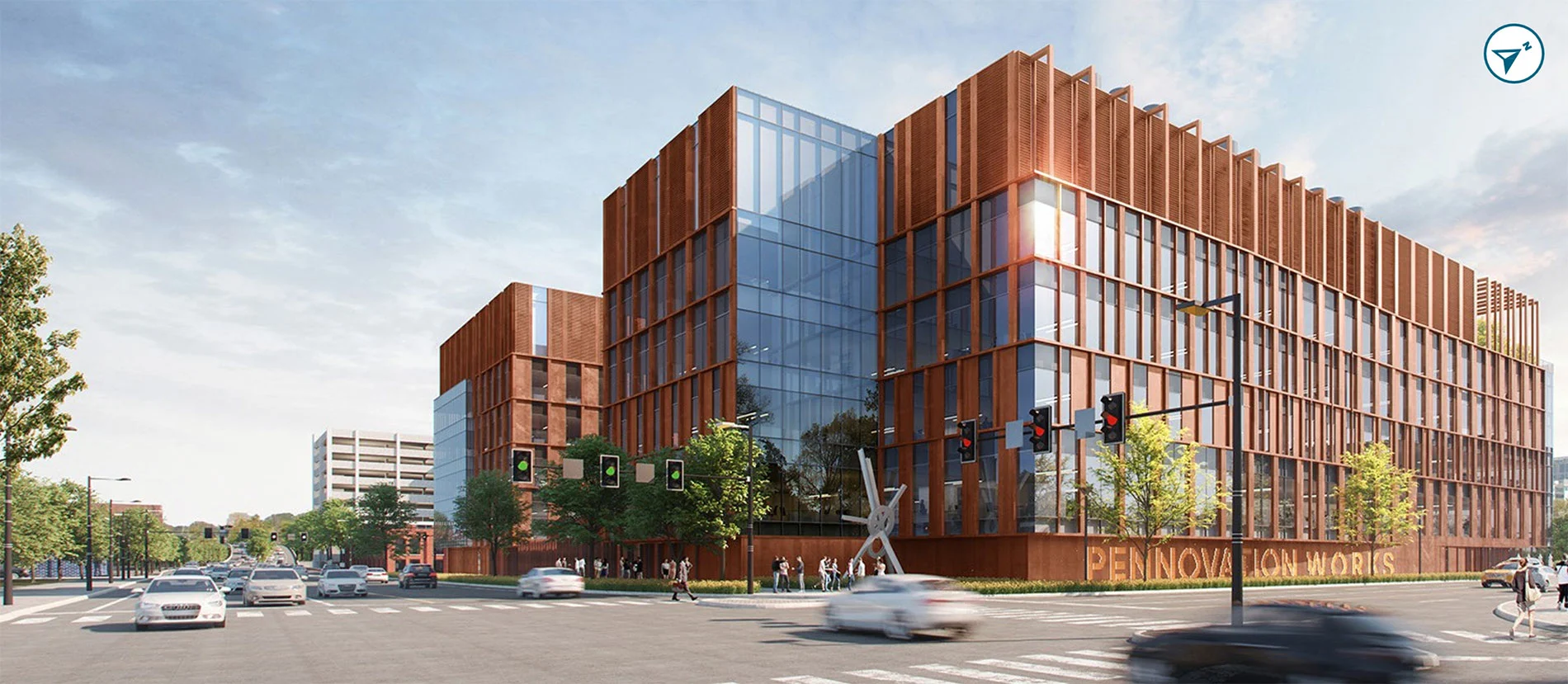This website uses cookies so that we can provide you with the best user experience possible. Cookie information is stored in your browser and performs functions such as recognising you when you return to our website and helping our team to understand which sections of the website you find most interesting and useful.
Pennovation Works

The acquisition of this former Dupont Campus in 2016 and subsequent renovation of Pennovation Center, Pennovation Labs, and a supporting office building have attracted university-affiliated and university-adjacent users in the incubator to early stage of their life cycle, including significant wet lab users.
To further the development of Pennovation into a world class ecosystem, Penn identified the need to solicit proposals from third-party developers for the next phase of its real estate evolution, a purpose-built, graduation lab and biomanufacturing facility that serves both Penn-affiliated companies and the broader Philadelphia life sciences ecosystem. This facility will be the first third-party developed and operated commercial facility on university-owned land.
RFP Response
Longfellow responded to Penn’s request for proposals to develop this facility and was successful in its bid for the project. Longfellow proposes to build 250,000-450,000 square feet of lab and biomanufacturing space in a single building, designed to provide graduation labs to Penn-affiliated and non-affiliated companies and biomanufacturing services for companies at all phases of the clinical trial cycle.
To meet the region’s needs for supported biomanufacturing space, Longfellow is partnering with the Centre for Commercialization of Regenerative Medicine (CCRM), a Toronto-based contract and development manufacturing organization (CDMO) with several unique models and servicing options. CCRM is able to provide ala carte manufacturing services, hoteling options for companies, and full-spectrum commercial operations. Additionally, CCRM’s commercialization services and venture arm provide direct company support for some of the most promising innovations in cell and gene therapy. CCRM has successfully nurtured companies to IPO.
Background
The University of Pennsylvania’s academic community includes some of the world’s most innovative scientists. However, technology transfer at Penn was not an area of focus prior to the tenure of University President Amy Gutmann (2004-2022). Gutmann identified an opportunity to commercialize Penn’s academic research and set out to create the university infrastructure that would be supportive of Penn’s innovative scientific community. In cooperation with the Executive Vice President’s office and Facilities and Real Estate Services, Penn developed a strategy to acquire a campus-adjacent site to serve as the university’s “clubhouse” for innovation, giving rise to Pennovation in the Grays Ferry section of Philadelphia.
Partnership
While Longfellow’s involvement in the Pennovation project is centered around the delivery of a world-class real estate facility, Longfellow’s partnership with the university goes much deeper than just the delivery of a building.
- Understanding the real estate challenge and opportunity: Longfellow executives have conducted an extensive series of interviews with Penn’s internal stakeholders to understand the history of and vision for the site, along with key internal political considerations for how the university thinks and talks about Pennovation. These conversations have enabled Longfellow to frame the development opportunity to bring Penn’s vision for the Pennovation campus to life.
- Convening a successful partnership for biomanufacturing operations: Longfellow’s partners have deep, industry-wide relationships across the globe that are the result of more than 12 years of operating exclusively in the life science and innovation real estate space. Longfellow recognized that Penn and Philadelphia’s success in its cell and gene therapy niche requires more than just a CDMO. Success requires commercialization resources and risk capital. In partnering with CCRM, Longfellow is able to leverage its non-real estate relationships and resources for the benefit of the development, the university, and the Philadelphia region.
- Coordinating internal stakeholder input into usage for the facility: Longfellow’s executive team has spent extensive time immersing itself in Penn’s ecosystem, from Facilities and Real Estate Services to Penn Medicine and Penn’s individual scientists and broader academic community. In collaboration with CCRM, Longfellow serves as a key convening entity for stakeholder input into the development across the university system. This iterative process has helped to shape and scope the CCRM business at the development, the size and scope of the manufacturing and lab facilities, the ecosystem curation of the campus, and the amenities and programming that will serve the ecosystem.
Creating a process and milestones to keep the project on track: With permission of the university, Longfellow is driving the process mapping for completing the development on a compressed timeframe that is designed to be responsive to the needs of Penn’s users. This includes working with Penn real estate executives to meet their deadlines for key approval meetings, laying out documentation milestones, and employing thoughtful budgeting techniques to ensure the project meets Penn’s desired completion date.

